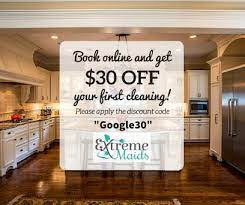
Clean floors are the sign of a clean home, and you can bet your bottom dollar that if your floors aren’t spotless, it will be the first thing visitors notice!
Here are a few tips for keeping your floors so clean you could eat your dinner off them – or at the very least, give visitors a positive impression of your home cleaning abilities!
What tools do you need to keep your floors clean?
The most basic tools necessary for clean floors are a good vacuum cleaner, a mop (whether it’s wet, dry or steam), and a broom is optional. You can use a good quality store bought cleaning solution, or make your own.
What’s the best way to clean a carpet?
For clean carpets, a vacuum is essential, and ideally, a good one with a HEPA filter. Lightweight and cordless ones are the easiest to use, naturally, but it pays to invest in a high quality one if you want to pick up as much dust, dirt, debris and dander as possible.
If your carpet is stained, you can buy an upholstery cleaner, or even hire a carpet cleaning machine for tougher or larger stains.
Keeping your wooden floors clean
If you’re not sure whether your wooden floors are surface-sealed, or oil or penetrating-sealed, you can try simply running your finger across the floor and seeing what happens. If you can see a smudge, then your floors are oil or penetrating-sealed, and if you don’t see a smudge, they’re surface-sealed. It can be helpful to know this before you begin cleaning your wooden floor, so that you can ensure your chosen method will be effective.
- For surface-sealed wooden flooring
Don’t use scalding hot water or abrasive cleaners, instead, use a combination of warm water, dish soap, and white vinegar or ammonia. Traditional glass cleaners are also very effective.
- For oil or penetrating-sealed wooden flooring
Sweep it with a broom or a dry mop before vacuuming, and don’t use any cleaning products that contain acrylic or water-based wax.
Keeping your laminate flooring clean
Avoid using soap, abrasives or any product that contains abrasives, and instead, clean the floors regularly with a dry or damp mop. If your laminate flooring is grubby, you can use a solution of diluted ammonia or white vinegar, but always use it sparingly.
Keeping your linoleum floors clean
Scalding hot water should also be avoided when cleaning linoleum, as with using abrasives or wax or solvent-based products, instead, regularly clean the floors with a dry or damp mop and if you need to use a cleaning solution, you can try diluted ammonia or white vinegar in small amounts.
Cleaning your tile and natural stone floors
Never clean this type of flooring with abrasives or a vacuum with a brush roll attachment, as these can damage the floor by scratching or cracking it. If your floor is made of ceramic or porcelain tiles, you can use oxygen bleach, chlorine bleach or diluted dish soap to clean it.
To keep your floors spotlessly clean all of the time, and with zero effort, simply hire a professional cleaner instead!

